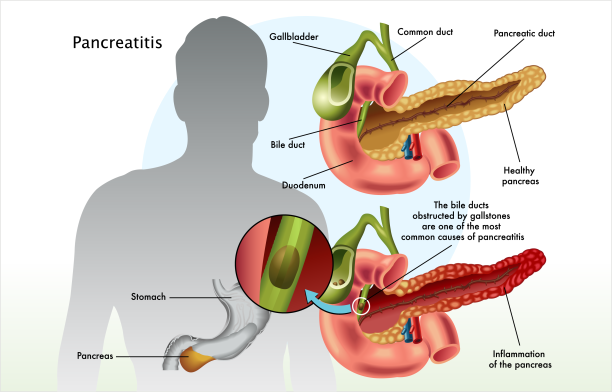pancreatitis
Pancreatitis is the redness and swelling (inflammation) of the pancreas. This happens when digestive juices or enzymes attack the pancreas. The pancreas lies behind your stomach on the left side of your belly. It is close to the first part of your small intestine (the duodenum).
FAQ
What causes pancreatitis?
The most common causes of pancreatitis include gallstones, alcohol consumption, and certain medications. Other causes include infections, high levels of triglycerides, trauma, and genetic factors.
What are the symptoms of pancreatitis?
Symptoms may include severe abdominal pain, nausea, vomiting, fever, and an elevated heart rate. In chronic pancreatitis, symptoms can include weight loss and malabsorption of nutrients.
How is pancreatitis diagnosed?
Diagnosis involves a medical history review, physical examination, blood tests to assess pancreatic enzymes, imaging studies (such as CT scans or MRIs), and sometimes endoscopic procedures.
Can alcohol consumption cause pancreatitis?
Yes, alcohol consumption is a common cause of pancreatitis, especially in cases of chronic pancreatitis. Excessive and prolonged alcohol use can lead to inflammation and damage to the pancreas.
What is the treatment for pancreatitis?
Treatment involves addressing the underlying cause. In acute cases, hospitalization may be necessary for pain management, intravenous fluids, and monitoring. Chronic pancreatitis may require dietary changes, medications, and sometimes surgery.
Can pancreatitis lead to diabetes?
Yes, chronic pancreatitis can lead to diabetes due to the impaired production of insulin by the pancreas. Diabetes management becomes an important aspect of treating chronic pancreatitis.
Are there dietary restrictions for pancreatitis?
During acute pancreatitis episodes, a clear liquid or low-fat diet may be recommended. In chronic pancreatitis, dietary modifications may include a low-fat diet, smaller and more frequent meals, and avoiding alcohol and certain trigger foods.
Can pancreatitis be prevented?
While not all cases can be prevented, lifestyle measures such as limiting alcohol intake, maintaining a healthy weight, and managing conditions like gallstones can reduce the risk of pancreatitis.
Is pancreatitis life-threatening?
Acute pancreatitis can be serious and, in severe cases, life-threatening. Chronic pancreatitis can lead to complications and affect quality of life. Timely diagnosis and appropriate management are crucial for better outcomes.


